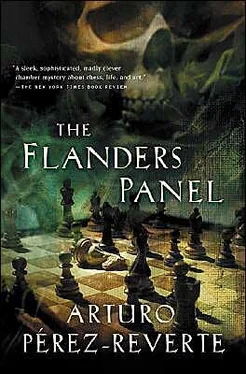“Really?” said Cesar, and Julia gave him a worried look.
“Yes, believe it or not,” Cifuentes said, with false modesty. “A subvariant of the Caro-Kann Defence, using two knights. You know the one: knight three bishop queen. The Cifuentes variant, it’s called,” he added, looking hopefully at Cesar. “Perhaps you’ve heard of it?”
“Naturally,” replied Cesar with great aplomb.
Cifuentes smiled gratefully.
“I can assure you it would be no exaggeration to say that in this club, or recreational society, as I prefer to call it, you’ll find the best players in Madrid, and possibly in all Spain.” Then he seemed to remember something. “By the way, I’ve found the man you need.” He scanned the room, and his face lit up. “Ah, there he is. Come with me, please.”
They followed him through one of the rooms, towards the rear.
“It wasn’t easy,” said Cifuentes as they approached. “I’ve spent all day turning it over in my mind. But then,” he half-turned towards Cesar with an apologetic gesture, “you did ask me to recommend our best player.”
They stopped a short distance from a table at which two men were playing, watched by half a dozen others. One of the players was softly drumming his fingers at the side of the board over which he was leaning with, thought Julia, the same serious expression Van Huys had given to the chess players in the painting. Opposite him, apparently untroubled by his opponent’s drumming, the other player sat utterly still, leaning slightly back in his wooden chair, his hands in his trouser pockets, his chin sunk on his chest. It was impossible to tell whether his eyes, fixed on the board, were concentrating on that or were absorbed on something else entirely.
The spectators maintained a reverential silence, as if what was being decided was a matter of life and death. There were only a few pieces left on the board, so intermingled that it was impossible, at least for new arrivals, to work out who was White and who was Black. After a couple of minutes, the man drumming his fingers used the same hand to move a white bishop, placing it between his king and a black rook. Having done that, he glanced briefly at his opponent and returned to his contemplation of the board and to his gentle drumming.
The move was accompanied by a lot of murmuring amongst the spectators. Julia went closer and saw that the other player, who hadn’t changed his posture at all when his opponent made his move, was staring intently at the intervening white bishop. He stayed like that for a while, when, with a gesture so slow it was impossible to tell until the last moment which piece he was reaching for, he moved a black knight.
“Check,” he said and returned to his former state of immobility, indifferent to the buzz of approval that rose about him.
Though no one said anything, Julia knew that he was the man Cifuentes had recommended to Cesar. She therefore watched him closely. He must have been just over forty, he was very thin and most likely of medium height. His hair was brushed straight back, with no parting, and was receding at the temples. He had large ears, a slightly aquiline nose, and his dark eyes were set deep in their sockets, as if viewing the world with distrust. He completely lacked the air of intelligence Julia now believed essential in a chess player; instead, his expression was one of indolent apathy, a kind of deep-seated weariness that left him utterly indifferent to his surroundings. Julia, disappointed, thought he had the look of a man who expects very little from himself, apart from making the correct moves on a chessboard.
Nevertheless – or perhaps precisely because of that, because of the look of infinite tedium written on his impassive features – when his opponent moved his king one square back and he then slowly stretched out his right hand towards the remaining pieces, the silence in that corner of the room became absolute. Julia, perhaps because she didn’t understand what was going on, realised that the spectators did not like him, that they felt not the least warmth towards him. She read in their faces a grudging acceptance of his superiority at the chessboard, for, as enthusiasts of the game, they could not help but see the slow, precise, implacable advance of the pieces he was moving.
“Check,” he said again. He’d made an apparently simple move, merely advancing a modest pawn one square. But his opponent stopped his drumming and rested his fingers instead on his temples, as if to calm a troublesome throbbing. Then he moved the white king diagonally back another square. He seemed to have three squares on which he would be safe, but, for some reason that escaped Julia, he chose that one. An admiring whisper round him seemed to suggest that the move had been an opportune one, but his opponent did not react.
“That would have been checkmate,” he said, and there wasn’t the slightest hint of triumph in his voice; he was merely informing his opponent of an objective fact. There was no pity there either. He pronounced those words before making another move, as if he felt it unnecessary to accompany them with a practical demonstration. And then, almost reluctantly, without appearing in the least affected by the incredulous look on the face of his opponent and on the faces of a good many spectators, he made a diagonal move with his bishop right across the board, bringing it, as it were, from some far distant place, and setting it down near the enemy king, but not near enough to constitute any immediate threat. Amidst the rumble of remarks that burst out around the table, Julia looked at the board in some bewilderment. She didn’t know much about chess, but enough to know that checkmate involved a direct threat to the king. And the white king appeared to be safe. Hoping for clarification, she looked first at Cesar and then at Cifuentes. The latter was smiling good-naturedly, shaking his head in admiration.
“It would, in fact, have been mate in three,” he told Julia. “Whatever he did, the white king had no escape.”
“Then I don’t understand,” said Julia. “What happened?”
Cifuentes gave a short laugh.
“That black bishop was the piece that could have delivered the coup de grace, although, until he moved it, none of us could see that. What happened, though, was that this gentleman, despite knowing exactly which move to make, chose to take it no further. He moved the bishop to show us what would have been the correct move, but he deliberately placed it on the wrong square, thus rendering it completely harmless.”
“I still don’t understand,” said Julia. “Doesn’t he want to win the game?”
“That’s the odd thing. He’s been coming here for five years now, and he’s the best chess player I know, but I’ve never once seen him win.”
At that moment, the chess player looked up, and his eyes met Julia’s. All his poise, all the confidence he’d shown during the game, seemed to have vanished. It was as if, when the game was over and he once more looked at the world around him, he found himself stripped of the gifts that ensured him the envy and respect of others. Only then did Julia notice his cheap tie, the brown jacket creased at the back and baggy at the elbows, the stubbly chin that had been shaved at five or six in the morning before catching the metro or the bus to go to work. Even the light in his eyes had gone out, leaving them grey, opaque.
Cifuentes said: “May I introduce Senor Munoz, chess player.”
“So, Watson,” continued Holmes with a chuckle,
“is it not amusing how it sometimes happens
that to know the past, one must first
know the future?”
Raymond Smulfyan
“It’s a real game,” said Munoz. “A bit strange, but perfectly logical. Black was the last to move.”
Читать дальше












